- Home
- Leslie Meier
Gobble, Gobble Murder Page 14
Gobble, Gobble Murder Read online
Page 14
Satisfied that he was gone, she went into the house herself. She wondered if she should call the police and report the incident. Looking at the phone, trying to decide, she rememberd Bear Sykes and his cell phone. Had he called the biker? she wondered briefly before dismissing the thought.
She was reminded of more pressing duties by Kudo, who was rubbing his wet nose against her hand.
“Come on and meet the family,” she said, pushing open the door to the family room.
CHAPTER 16
That evening, having reclaimed the family room, Bill switched off the TV at ten and he and Lucy headed for bed. Kudo had been sleeping at Lucy’s feet, but as soon as she stood up, he also got up and stretched. Then he looked at her expectantly. She went through the kitchen and he followed, nails clicking on the bare floor. She opened the back door for him and he trotted out, obviously with a mission in mind.
Lucy decided she might as well use the bathroom herself; then she opened the door and called the dog. He appeared out of the darkness almost immediately and she let him in, pointing to the bed she had put down for him in a comer of the kitchen. Kudo approached it cautiously, suspiciously sniffing the expensive, flea-repellent bedding.
“Go on,” said Lucy in a reassuring voice. “It won’t bite.”
Then she turned out the light and opened the door to the back stairs. As she started up, Kudo was right at her heels.
“Oh, no,” she said, turning around and pointing him to the dog bed. “You sleep in the kitchen.”
Kudo dropped his head and made a little whining sound.
“That’s enough,” said Lucy sternly. “Down you go.”
The dog turned and went down a few steps, then paused, shivering pathetically.
“It’s not cold in the kitchen. It’s a lot warmer than my room—that’s for sure,” she told him.
He raised his head and looked at her, somehow turning his yellow dog eyes into pools of melting chocolate.
“Okay. You win,” said Lucy, resuming her climb up the stairs. “Just for tonight. I know it’s hard getting used to a new home.”
“What’s he doing up here?” asked Bill, who was in bed reading a homebuilder’s magazine.
“He followed me up the stairs.”
“You know, Lucy, I’m not at all sure why we have this dog, but he’s sure as hell not sleeping with us.”
Lucy looked wounded. “You said it would be okay.”
“I don’t remember that,” said Bill. He got out of bed and snapped his fingers. “C’mon, boy.”
Kudo stepped closer to Lucy and made a noise that began as a whine but ended with a throaty rumble.
Bill looked at the dog, narrowing his eyes.
“I think he wants to stay with me,” said Lucy.
“That’s obvious,” said Bill as he climbed back in bed. “But do we want him to stay with us?”
“I don’t mind,” said Lucy. “Do you?”
Bill sighed. He’d lost this battle before, when the kids were little and wanted to sleep in their parents’ bed. He’d believed the books that said children must learn to sleep by themselves, but Lucy could never stand to send them back to their cold, solitary beds, where frightening monsters lurked in the dark.
“I guess not,” he finally said. “But not on the bed.”
Lucy settled herself on the pillows, propping a book on her chest. Kudo stood beside the bed, resting his chin on the mattress.
Lucy gave her head a little shake and the dog expelled a huge breath and curled up on the carpet next to the bed. Lucy let her arm drop and gave his head a scratch.
* * *
The next morning, after Bill and the kids had left the house, Lucy pulled on a warm jacket and took the dog out for some exercise along the old logging roads that ran behind their house. Lucy walked at a good pace, enjoying the fresh air and sunshine. Kudo ran ahead of her, sniffing the ground and chasing rabbits, but returning frequently as if to check that she was still there.
Lucy picked up a stick and threw it. Kudo ran after it and brought it back to her, grinning proudly. She threw the stick a few more times, then realized it must be getting late. She checked her watch and discovered it was time to go home if she planned to go to Curt Nolan’s funeral service.
Back at the house she gave Kudo a fresh bowl of water and a dog biscuit, then hurried upstairs to change her clothes.
As she tugged on her black pantyhose, Lucy considered the best route to the Indian Meeting House in Hopkinton. The most direct way was along the back roads she had taken the day before, but remembering the dirt biker she decided to take the long way round on the highway. Chances were that the biker, whoever he was, was just some kid who’d been having fun at her expense. Sure, the leathers and helmet had looked menacing, but that was just the style. They all wore them. No doubt the biker was back in school today or maybe even back on the job.
Lucy slipped on one black leather pump and sat holding the other. Maybe the biker wasn’t a kid at all. Come to think of it, dirt biking was an expensive sport when you added up the cost of all the equipment, and there weren’t too many kids in Tinker’s Cove who had that sort of money.
But if he were a grown man, she wondered, what was he doing harrassing her like that? It was the kind of stunt a kid would find funny, but it wasn’t the sort of thing an adult would even think of doing.
She put the shoe down and slipped it on. Rocking back on her heels, she lifted her toes, then slowly lowered them and put her hands on her knees. Why had that biker been so interested in her and why had he followed her home? Had it been an intentional move to find out where she lived?
Even more disquieting was the thought that Bear Sykes might have summoned the biker, using his cell phone. What possible reason would he have for doing that? she wondered as she stood up and fastened her faux pearls around her neck.
Come to think of it, Sykes had seemed awfully interested in what she knew about the murder. That didn’t mean he was involved in any way, she told herself. As the tribe’s leader he would naturally want to know how the investigation was proceeding.
After one last check in the mirror to make sure her slip wasn’t showing, she decided she was ready. She was probably being paranoid, but she wasn’t about to risk another encounter. Today, she’d stick to the highway.
It was funny, she thought as she carefully closed the door behind so Kudo couldn’t get out. She hadn’t felt a bit nervous this morning when she was walking with Kudo; she had felt sure that the dog would protect her. But even in a car she didn’t want to risk the same deserted roads by herself.
As she started the car, she thought it might be a good idea to pay attention at the funeral and see who was there and who wasn’t and to keep an eye out for strange behavior.
* * *
Arriving at the plain little country church with only minutes to spare before the service was scheduled to start, Lucy felt a surge of sympathy for Ellie. Judging from the number of cars and the crowd of people, not to mention the large white trucks topped with satellite dishes bearing the logos of the Portland TV station and Northeast Cable News parked along the road opposite the church, it was going to be a three-ring circus. It was bad enough to lose someone you loved, but to have your private grief turned into a public spectacle made it all that much worse.
Lucy had to park at least a quarter of a mile farther down the road and had to hike back to the church in her uncomfortable high heels. She arrived, out of breath, just as the bell was tolling. As she drew closer she realized she hadn’t needed to worry about getting a seat—this crowd wasn’t interested in attending the service. The people gathered on the church lawn were demonstrators, content to stand outside in view of the TV cameras. A few were holding placards with a photograph of Nolan demanding Justice for Our Brother.
Lucy looked for a familiar face, but the only person she recognized was Bear Sykes. Dressed in a denim shirt with a beaded chestpiece worn over it, he was being interviewed by a TV reporter. As she mounted
the steps, she heard him deliver a ringing declaration and stopped to listen.
“If Curt Nolan were white, you can be sure the police would not be dragging their feet in investigating his murder. We demand equal treatment—justice in life and in death!”
He raised a fist and the crowd of protesters erupted in cheers and applause. Placards were held aloft and someone began beating a drum.
The crowd began chanting, “Justice! We want justice!”
Watching the spectacle unfold before her, Lucy found herself reaching for her reporter’s notebook and camera. She didn’t have them, of course. She’d left her big everyday bag at home and had brought her small, dressy purse. Maybe Ted was here, she thought, hopefully scanning the crowd of reporters gathered outside the churchyard for his face.
There was no sign of him. Lucy wondered what to do. She had come to attend the funeral service, but maybe she should stay outside and cover the demonstration. A few police cars had arrived without sirens, but the barking of their radios could be heard and their roof lights were flashing. A certain tension seemed to be building among the demonstrators and their chanting was getting louder. Lucy remained on the steps, hesitating.
A few organ chords made up her mind and she pulled open the heavy door. Inside, the church was quiet and dim and smelled like old wood and chrysanthemums. She waved away the usher, declining to sit and instead remained standing in the rear of the church. From that vantage point she could see the whole church and the fifty or so people who had come to the service.
In the front row she spotted Ellie and two attractive young women she took to be Ellie’s daughters sitting on her left. On Ellie’s right, Lucy was surprised to see a man. She couldn’t tell who he was from his back, but he was very solicitious of Ellie, who was leaning against his shoulder.
When the hymn began and everyone stood, the man turned around as if to check and see how many people had come. Lucy was astonished to recognize Jonathan Franke.
As the hymn droned on, Lucy struggled to make sense of this new development. Perhaps he was simply an old friend who had put aside his dislike of the deceased to offer support to Ellie. Or perhaps, thought Lucy, he was taking advantage of the death of a hated rival to advance his own case as a suitor. The final amen sounded and Lucy wrestled with a vague sense of guilt. Here she was in church and all she could think of was sex and murder.
“Let us pray,” began the minister, a stocky, white-haired man with a ruddy complexion, and Lucy took the opportunity to check out her fellow mourners.
Just a few rows behind Ellie she saw Chuck Canaday and Andy Brown, along with Joe Marzetti. Ah, she thought rather cynically, the business community. Never ones to alienate customers, they showed up at almost every funeral.
On the other side of the narrow aisle she spotted a few more members of the board of selectmen: Sandy Dunlap and Bud Collier. There was no sign of Pete Crowley or Howard White; even this prime opportunity to win some votes had not been attractive enough to overcome their dislike of Nolan. She didn’t see Fred Rumford either, even though he could have used the funeral as an occasion to bridge the widening gap between the museum and the tribe. Perhaps knowing he was a suspect, he hadn’t wanted to draw attention to himself.
Listening with half an ear to the minister, Lucy followed her own thoughts. Maybe the absentees had been afraid of appearing hypocritical, since they had all had their differences with Nolan. Personally, Lucy thought they were mistaken. By attending the funeral they could have shown respect for Nolan and for the Metinnicut people.
A sudden increase in the noise level from the crowd outside drew Lucy’s attention and she decided she’d better see what was going on. She tiptoed to the door and, opening it as little as possible, slipped through. Once outside on the stoop she paused, horrified.
Dozens of police officers in full riot gear were advancing on the demonstrators with raised shields and batons. At first the demonstrators stood fast, huddling together in passive resistance behind their leader, Bear Sykes. Then a sound like a shot was heard.
Lucy was never convinced it actually was a gunshot; she thought it was probably a backfire from a passing car. Whatever it was, it had the effect of terrifying the crowd of demonstrators, who suddenly broke ranks and began running for safety, pursued by police officers through the churchyard and adjacent cemetery. Sykes remained in place, vainly calling for order, until he was collared himself and led to a cruiser.
Lucy watched in dismay as the officers wrestled people to the ground and handcuffed them. She winced at the thwack the batons made when they connected with human flesh. She heard the screams of fear and pain. Nevertheless, she was able to remain a detached observer until she saw a young child in a familiar threadbare lavender jacket. Tiffani had apparently become lost and separated from her family and was wandering about, dazed, with tears streaming down her face.
Jumping down the stairs Lucy ran to the little girl and scooped her up in her arms.
“Hold it right there,” said a gruff voice.
Lucy froze, hugging Tiffani to her chest and patting her back. Next thing she knew she was seized roughly by the shoulders, the screaming Tiffani was torn from her arms and her wrists were restrained.
“I’m not—” she began in protest, attempting to make eye contact with her captor.
All she saw was her own face, very small, reflected in his aviator sunglasses.
“Tell it to the judge,” he said as he thrust her inside the crowded paddy wagon.
CHAPTER 17
Judge Joyce Ryerson wasn’t interested in what Lucy had to say. She tapped her long polished nails on the bench impatiently.
“How do you plead?”
“There’s been a misunderstanding.”
Receiving a warning glance from the judge, Lucy decided this was not the time to argue. “Not guilty.”
“Thank you,” said the judge, with exaggerated politeness. “You’re due back in court on December fifteenth.”
“That’s so close to Christmas,” protested Lucy.
The judge ignored her and studied a sheet of paper.
“I see no reason not to release you on your own recognizance. See the bailiff.”
She banged down her gavel and Lucy got in line behind the other accused lawbreakers at the bailiff’s desk. When it was her turn she waited while he scribbled on an official-looking form.
“That’ll be fifty dollars,” he finally said without even raising his head.
“Fifty dollars?” Lucy knew she didn’t have that much money in her wallet. She guessed she had something in the neighborhood of five dollars. “Can I write a check?”
He raised his head and lifted an eyebrow.
“Do you take Visa?”
He shook his head.
“I understand I get a phone call?”
He nodded and she was led back to the holding cell.
When she finally got her turn at the phone, Lucy didn’t know whom to call. Bill was on the job and nobody was home. She could leave a message on the answering machine, but the odds of one of the kids actually listening to the message and taking action weren’t good. She could call the paper, but suspected Ted was most likely out on assignment. Phyllis usually only worked mornings, which meant she’d have to leave a message and trust he’d check the machine before quitting for the day. Besides, it was getting late and the banks would be closing soon. She knew he refused to carry an ATM card and the chances he would have fifty dollars in cash were slim.
Her best bet, she finally decided, was to call Bob Goodman, Rachel’s husband. He was a lawyer, after all. He would know what to do.
“The law office of Robert Goodman. May I help you?”
Martha Bennett’s voice was music to Lucy’s ears. “Martha, this is Lucy Stone. Could I speak to Bob?”
“Lucy, I’m afraid he’s not in right now. Can I take a message?”
Lucy didn’t want to tell this very proper, silver-haired lady that she needed bail, but she didn’t really h
ave a choice.
“I’m in a bit of a jam and need Bob to bail me out.”
Martha Bennett didn’t seem at all surprised. Lucy supposed she’d gotten calls like this before.
“Don’t worry, Lucy. I’ll page Bob immediately. How much do they want?”
“Fifty dollars.”
“He’s on his way.”
This time, as Lucy was led back to the holding cell once again, she felt encouraged. Bob was on the way; Bob would rescue her.
She sat down on the steel bench, squeezing in between a rather heavy woman in flowing handwoven garments, who was obviously one of the protesters, and a tiny, shrunken woman, who was shaking uncontrollably.
“DTs,” said the heavy woman with a knowing nod. “Better give her plenty of room.”
She had no sooner spoken than the tiny woman doubled over and vomited on the floor. Some of the other women in the crowded cell made sounds of disgust; the gray-haired woman called for the guard.
Nobody came to clean up the mess. There was no place to go; no other seat was available in the crowded cell. Lucy concentrated on a brown water stain on the opposite wall. She tried to ignore the smell; she tried not to notice the woman’s trembling. Instead, she tried to frame the story she would write for the Pennysaver about the morning’s events.
The thing that most struck her, she decided, was the contrast between the quiet mourners inside the church and the pandemonium outside. To her, it seemed the protesters and the police were equally guilty of disturbing the funeral service.
Her thoughts turned to Ellie and the figure beside her: Jonathan Franke. There had been something in the way he’d angled his body toward Ellie, something in the way his hand lingered on her back, that made Lucy doubtful he was acting simply as a friend. She would have bet her bail money that Jonathan Franke was hoping to take Curt Nolan’s place as Ellie’s boyfriend.
If that was true, she thought, it gave Franke a real motive for killing Nolan. She remembered the pie sale, where the two had argued. Now that she thought about it, the two men had exhibited more animosity than could be accounted for by their differing views about zoning regulations. In fact, she remembered, Franke had been so angry he had stalked off without finishing his pie—a definite first for the pie sale.

 Christmas Card Murder
Christmas Card Murder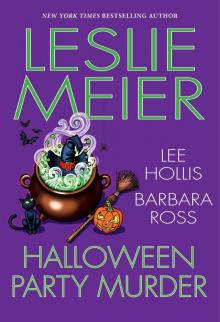 Halloween Party Murder
Halloween Party Murder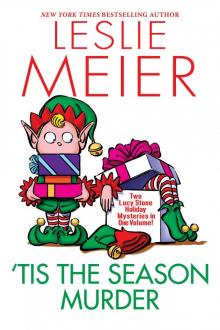 'Tis the Season Murder
'Tis the Season Murder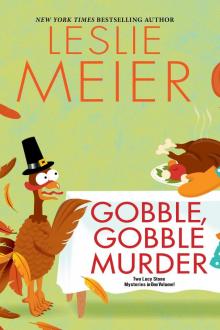 Gobble, Gobble Murder
Gobble, Gobble Murder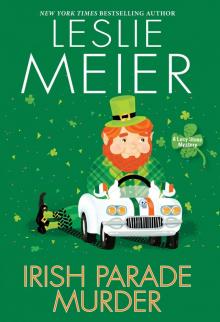 Irish Parade Murder
Irish Parade Murder Bake Sale Murder
Bake Sale Murder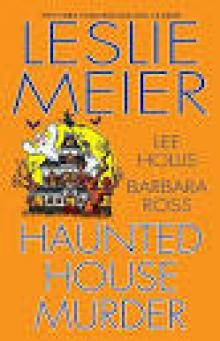 Haunted House Murder
Haunted House Murder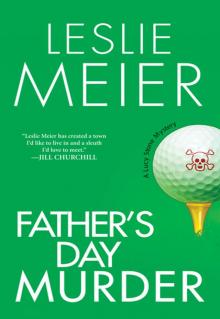 Father’s Day Murder
Father’s Day Murder Chocolate Covered Murder
Chocolate Covered Murder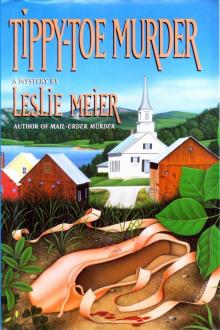 Tippy Toe Murder
Tippy Toe Murder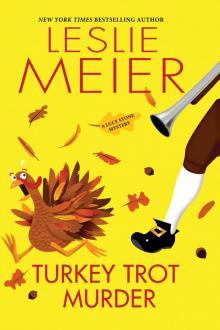 Turkey Trot Murder
Turkey Trot Murder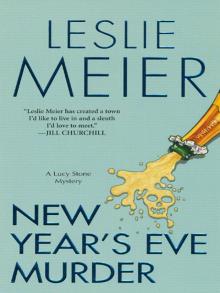 New Year's Eve Murder
New Year's Eve Murder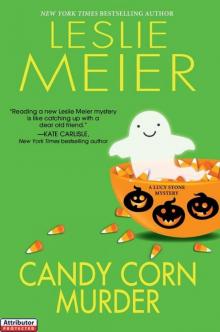 Candy Corn Murder
Candy Corn Murder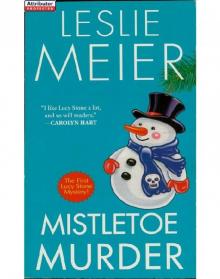 Mistletoe Murder
Mistletoe Murder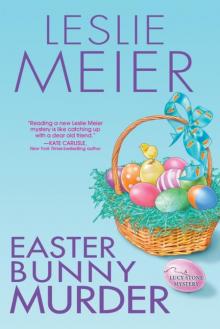 LStone 20 - Easter Bunny Murder
LStone 20 - Easter Bunny Murder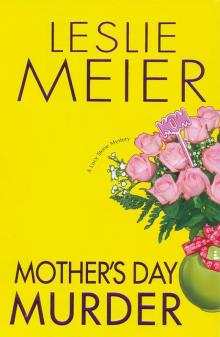 Mother's Day Murder
Mother's Day Murder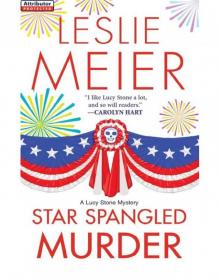 Star Spangled Murder
Star Spangled Murder Silver Anniversary Murder
Silver Anniversary Murder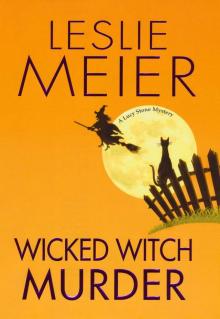 Wicked Witch Murder
Wicked Witch Murder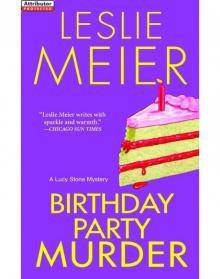 Birthday Party Murder
Birthday Party Murder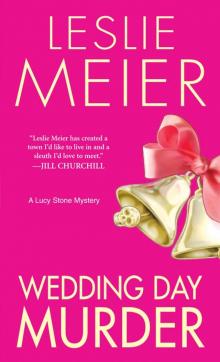 Wedding Day Murder
Wedding Day Murder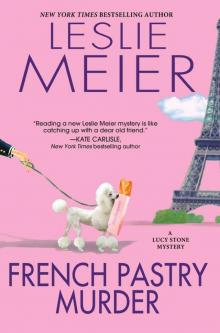 French Pastry Murder
French Pastry Murder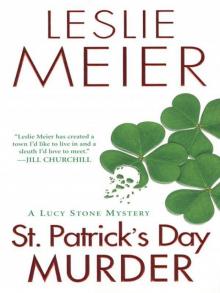 St. Patrick's Day Murder
St. Patrick's Day Murder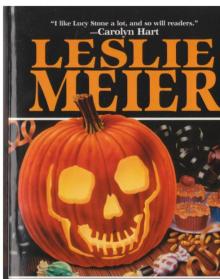 Trick or Treat Murder
Trick or Treat Murder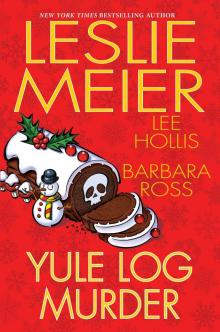 Yule Log Murder
Yule Log Murder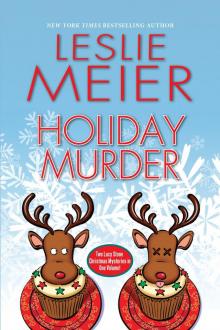 Holiday Murder
Holiday Murder British Manor Murder
British Manor Murder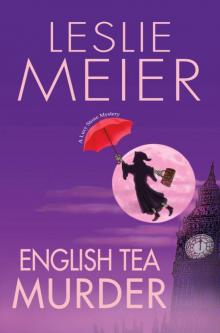 English Tea Murder
English Tea Murder